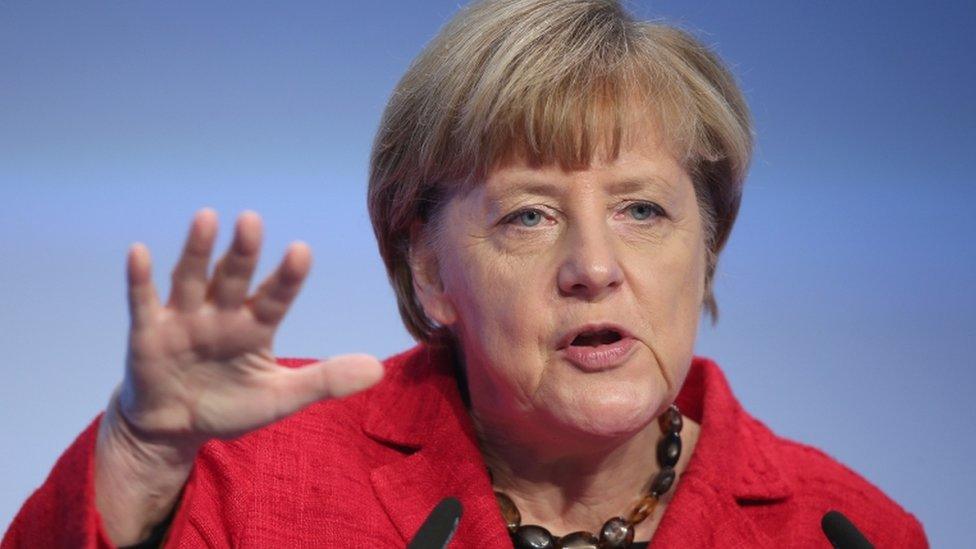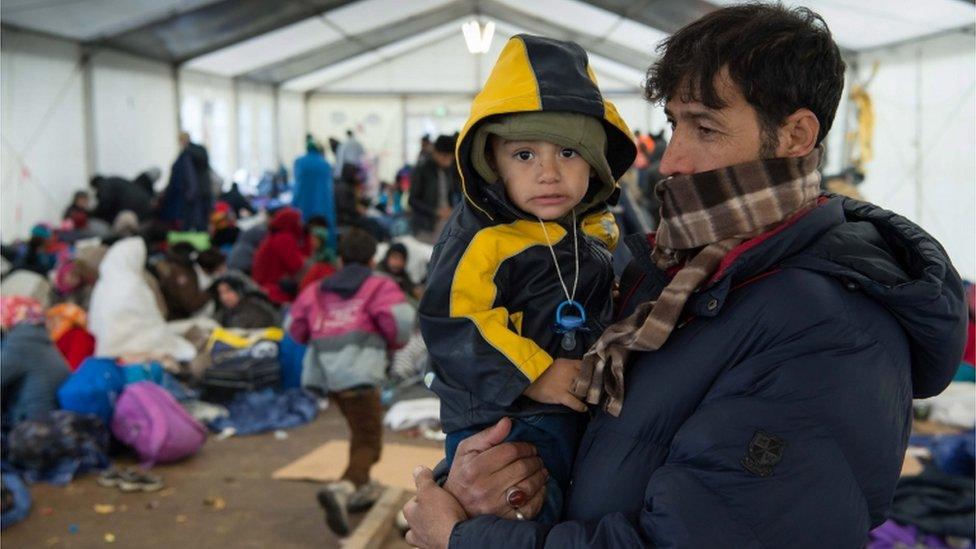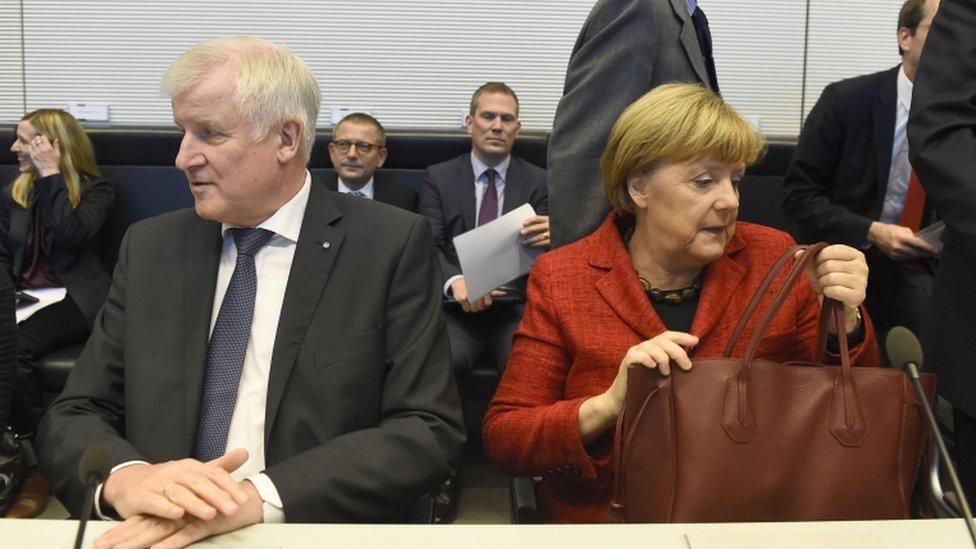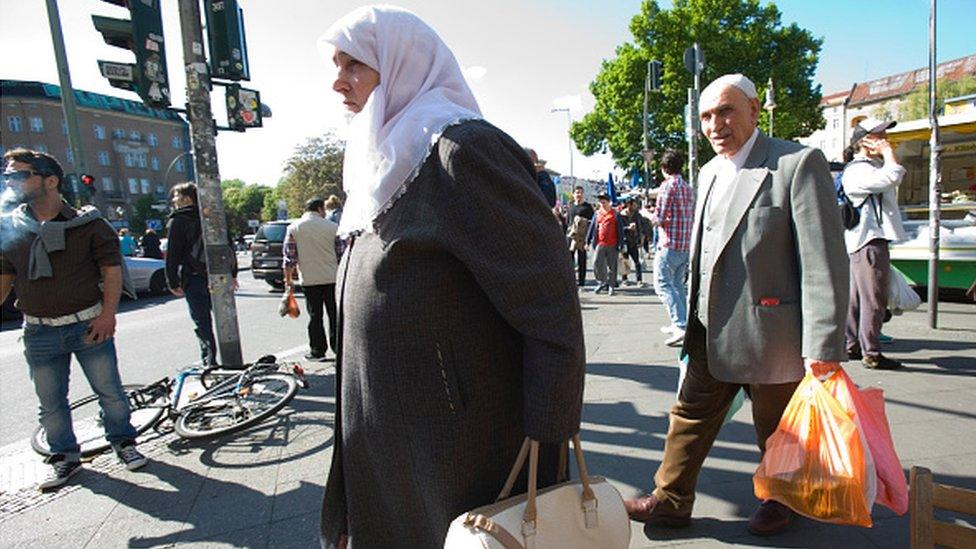Migrant crisis will decide Merkel's future
- Published
- comments

Western Europe's most powerful leader will survive - for now.
Angela Merkel has struck a truce with a key right-wing coalition partner unhappy about her stance on migration.
But the fact that there is another tricky meeting on Thursday emphasises that this is a reprieve not a final judgement, external.
The danger to Merkel from the refugee crisis may not be the stuff of front-page headlines in Britain, but it is real enough.
Some in Germany are seething at the seemingly limitless commitment the chancellor has made to take in anyone fleeing Syrian's civil war.
One German politician told me he was in a meeting where he watched British ministers panic over David Cameron's promise to take in 20,000 more refugees over the next five years.
"My country has to cope with that number every single week, external."
Even those who have no cultural qualms, external are worried about how the country will deal with the sheer number of new people.
Mutti has applied balm to the wound, and covered it with a sticking plaster. It is what mothers do.
Angela Merkel's nickname captures the sense of a leader of homely, sensible authority and comforting common sense.

Germany has attracted many people fleeing war in Syria
The verb "to Merkel", external - prevaricate - could soon have a whole new meaning: she who dares, wins. Perhaps.
The sticking plaster could soon peel off, leaving the wound merely less politically visible, although still publicly festering.
She has risked her reputation on a gamble that at first sight seems totally out of character - "reckless" is not a word you would normally apply to her 10 years in power.
One usually loyal German politician told me her decision to open Germany's borders to all refugees from Sudan and Syria was "madness".
He said a mayor in his area was phoning him almost nightly in tears.
Threat of revolt
The political crisis came about because the leader of the Bavarian Conservative party, a member of her coalition, was threatening to revolt.
The writ of Mrs Merkel's party, the Christian Democrats, does not run in Bavaria - they have their own Conservative party, the Christian Social Union.
Bavaria is funny like that. It even has its own embassy in Berlin, something the Edinburgh government has yet to achieve in London.

Horst Seehofer has won concessions from Mrs Merkel
Anyway, the CSU is somewhat further to the right than the Christian Democrats, and its leader, the Bavarian Prime Minister Horst Seehofer, gave Mrs Merkel a series of ultimatums, external, the most serious being a limit to the number of migrants.
He didn't get that in an agreement struck last weekend. But the joint paper by the two parties won him some concessions, external.
It started with an assertion that manages the difficult trick of being both contentious and bland: "The people in Germany trust in our ability to cope with even the most difficult challenges."
The trusting people are then promised new "transit zones for speeded-up asylum procedures" - something Mrs Merkel's other partners, the Social Democrats, don't like at all.
There is also a two-year halt to reunifying refugee families and proposals for better co-operation with Austria - who Bavarians blame for not controlling the situation better.
Significant gamble
All this may have saved Mrs Merkel's political bacon.
It doesn't explain why she took this gamble in the first place.

Angela Merkel:
1954: Born Hamburg
1978: Earns physics doctorate with a thesis on quantum chemistry
1990: Joins CDU, and is elected to the Bundestag, almost immediately becoming minister for women and youth under Chancellor Helmut Kohl
1994: Becomes minister for environment and nuclear safety
2000: Becomes CDU leader
2005: Becomes chancellor
2009: Re-elected chancellor
2013: Wins a third term

With her scientific background as a chemist, she is often seen as the least ideological of politicians, one who objectively examines all the facts, listens to all the argument and then makes a rational decision, trying to bring all sides together.
One aide recalls that when he warned her no-one agreed with her position, she said: "That's my job, to bring them onside."
All this is true. But it also misses something.
Perhaps we could muse fancifully that as her specialty was quantum chemistry, where the apparently impossible occurs, she understands that observation of a situation changes the situation itself.
More likely the resonant entanglement is because she was brought up in East Germany when it was under communist rule, the daughter of a Lutheran pastor, and that she is, like many Germans of her generation, very aware of her country's hideous past.
I was going to write "haunted" but I don't think that is right - it is more that her decisions are informed by history, a courageous and conscious decision to do the right thing.
It is a decision to change her country.

Turkish people were long denied German citizenship
Germany is now more mixed, more multicultural than would have seemed possible a generation ago - indeed it was only in 2000 that it became much easier for the children of Turkish "guest workers" to become citizens.
That doesn't mean that "the right thing" might not prove to be foolhardy and unworkable.
One senior diplomat I know argues this is very Merkel; she takes a decision without fully laying out the consequences, thus forcing the facts - and other politicians - to fall in line with the dynamic she has created.
It is an attractive theory but it doesn't explain how Mrs Merkel thought she could throw the switch on an electro-magnet, pulling in the dispossessed from another continent, without providing the transport, food, medical support and bureaucratic effort to facilitate their travel to the newly promised land.
Europe as a whole is still struggling to cope with growing numbers of people looking for a better life.
Slipping authority
So some say Merkel's race is run, external.
Her authority and popularity are slipping at home, her clout in Brussels diminishing.
We don't know, but the next few months will be crucial.
She has yet to decide whether to run for another term in 2017, but there is no star on the horizon, no obvious competition from within her party or outside it.
Even as her poll ratings fall, external, they are nowhere near as low as those of the leader of her main rival party, the SPD.
Her decision whether to go for another five years as chancellor will almost certainly be dictated by the outcome of this crisis.
How she continues to manage it may also determine how history sees her, and what becomes of the European Union, external and Europe as a whole.